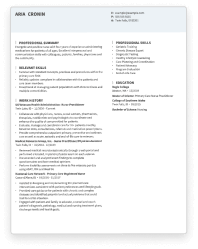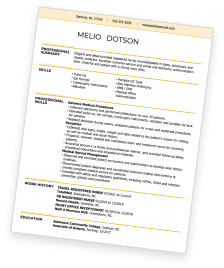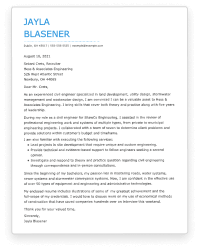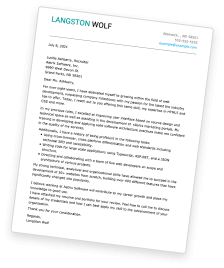Counselor Resumes: Overview
As a counselor, you play a crucial role in providing support, guidance, and assistance to individuals and families facing various challenges, as well as conducting client assessments, developing/implementing treatment plans, and connecting clients to community resources.
Counseling jobs can be found in many different environments, including:
- Nonprofit organizations
- Government agencies
- Hospitals and healthcare facilities
- Mental health clinics
- Schools and Universities
Successful counseling requires communication skills, empathy, cultural competence, and the ability to work with diverse populations. Hloom is here to help you create a resume showcasing your impressive qualifications to get your next job as a counselor!
Are you ready to get started? Explore our professional examples and customizable templates, and download a professionally designed resume template today! Our guides and examples will help you create a winning resume today!
Mental Health Counseling Resume Example
Check out this first example of a resume for a counselor with an extensive mental health work history. The design and content convey professionalism and underscore the candidate’s experience. Here’s what makes this resume stand out:
Professional Design: This counseling resume has a clean and well-organized layout. Using a visually appealing resume design will catch the reader’s eye. Notice how graphic elements like lines, dots, and a touch of color help organize the content and make it easy to read.
Clearly Labeled Content: This example of a counselor’s resume communicates the candidate’s skills, experience, and qualifications without overcrowding the page. Using capitalization and color emphasizes the section headings, making it easy for hiring managers to find information quickly.
Impressive Professional Summary: This candidate’s summary statement highlights their skills and expertise and what they can bring to the role. In a few brief sentences, they convey personal qualities such as being insightful and compassionate while emphasizing communication skills, work ethic, and the ability to help patients overcome challenges and explore their issues.
Comprehensive Work Experience: This chronological-style resume perfectly showcases the candidate’s six years of relevant work experience. The bullets under each job entry detail their experience applying various methodologies to assist patients, maintaining clinical documentation, and assessing patient behavior.
Mental Health Counseling Resume Sample
Let’s look at this second example of a counselor’s resume. Its compelling and visually appealing design may be the key to landing the counseling position you want. The structure and content are sure to impress employers and help you secure an interview:
Structured Layout: This resume is well-organized with clear headings, making it easy for employers to navigate. The combination format emphasizes the candidate’s most relevant skills first and then provides a detailed work history. This is an excellent format choice if you have limited counseling experience.
Engaging Professional Summary: The resume summary provides a compelling snapshot of the candidate’s counseling experience and skills. Using descriptive words like “skilled” and “compassionate” makes a solid first impression. A concise and persuasive summary will engage the reader, so they will want to learn more.
Aesthetic Appeal: This resume design is visually engaging without being overly complex. Using a professional font, clearly labeled sections, and dividing the content into columns makes it visually appealing. The block of color at the top creates structure and highlights the counselor’s name and contact information.
Detailed Skills Sections: This counselor’s resume includes two sections to highlight their skills. First, they list their most relevant skills in short sentences. This section is tailored to the job description and clearly explains the candidate’s soft skills and counseling abilities. Then, in the second column, they list professional skills, highlighting hard skills and technical knowledge to emphasize their qualifications.
How to Write a Counselor Resume
When you are looking for the right counseling job, you need a resume that makes you stand out as a candidate. Writing a detailed resume outline is the first step to creating a winning resume:
Pick a Format:
Choose a resume format that aligns with your level of experience as a counselor.
A chronological format is the best choice to emphasize extensive work experience. This format is highly recommended because most employers value a detailed work history that clearly shows your impact in previous roles.
However, if you have limited experience or are just starting your counseling career, a functional format will highlight your skills and qualifications instead of experience.
Or, try the combination format to balance both skills and job experience in a visually appealing way.
Contact Information:
As you probably know, you should Include your full name, contact number, email address, and location at the top of your resume.
You can also include a LinkedIn Profile if you like. Just be sure that your contact information is accurate, current and professional.
Resume Summary or Objective:
Recruiters generally scan resumes in a matter of seconds. Craft a concise summary or objective that spotlights your counseling skills and expertise and what you offer to the role to catch their attention quickly. This statement should be 2-3 sentences long and tailored to the job you’re applying for.
A resume summary works best if you have relevant work experience you can include along with your skills to bring your top qualities to attention.
If you are new to counseling, an objective statement will personalize your resume, inform employers of your career goals, and give you the chance to show your passion for the position.
In either case, make sure your summary or objective clearly highlights your best qualifications that encourage the reader to learn more about you!
Work History:
Detail your counseling work experience, beginning with your most recent position and working backward. Use this section to highlight your key accomplishments and responsibilities in previous roles to emphasize your expertise in counseling.
Include:
- the job title
- name of the employer
- location
- the dates of employment
- bullet points to showcase your value as an employee
Choose the most relevant responsibilities and achievements, and use numbers and percentages to demonstrate your impact.
For example, “Lead up to 25 individual counseling sessions per week and 10 group therapy meetings while maintaining a 95% retention rate over 12 months.” Or “Provided emergency response to an average of 15 crisis situations per month, resulting in over 60 successful treatments.”
By structuring your work history like this, you show not only what you did as a counselor but how your actions had a valuable impact on clients, which solidifies your counseling credentials.
Skills:
Counseling jobs require a mix of soft skills, hard skills and technical knowledge. Create a dedicated section of your resume to showcase your counseling-related skills.
In general, include hard skills like assessment, intervention, and counseling techniques to demonstrate your professional qualifications.
Then, add soft skills like communication and empathy to show you work well with people. If you have relevant computer skills like knowledge of case management software, be sure to list that as well.
Always pick the most relevant skills by reading the job description and matching your abilities appropriately. You may need to reword your skills to match what is written in the job description because this makes your resume ATS-friendly.
Education:
List your educational qualifications, including your degree, university, and location.
You can also include post-graduate courses related to counseling, workshops, and other training you have received to demonstrate your commitment to learning and professional development, however, you may also want to consider listing them in a separate section (see below).
Additional Sections:
If you have enough space on the page, you can include any extra sections to enhance your counseling resume.
Adding a section for certifications, licenses, or professional memberships can validate your qualifications for the job.
Likewise, including volunteer experience can demonstrate your commitment to serving the community and illustrate your unique fit for the position.
Key Skills for Counseling Resumes
As a counselor in social services, you have developed a mix of hard skills like client assessment and soft skills like empathy. Including the right skills on your resume can set you apart from the competition.
You should always tailor your resume to each job application and to reflect your personal qualifications as a counselor. To help you get started, we have compiled the top five hard skills and soft skills for counselors below as inspiration.
Top 5 Hard Skills for a Counselor
- Assessment and Evaluation: Proficiency in assessing a client’s needs and creating personalized treatment plans is essential to most counseling roles.
- Crisis Intervention: Skill in managing and deescalating crisis situations and providing immediate support to clients in distress demonstrates your ability to handle complex cases.
- Counseling Techniques: Expertise in various counseling modalities, such as cognitive behavioral therapy or motivational interviewing, increases your ability to provide client care.
- Resource Coordination: Connecting clients with community resources and support services is vital to counseling a diverse clientele.
- Case Management: Proficiency in managing caseloads, maintaining accurate client records, and tracking progress illustrates your ability to juggle multiple clients.
Top 5 Soft Skills for a Counselor
- Empathy: The capacity to understand and empathize with clients’ experiences and emotions allows counselors to connect with clients and understand their challenges.
- Communication: Effective verbal and nonverbal communication skills are necessary for successful interactions with clients and colleagues.
- Active Listening: Being skilled in active listening allows counselors to comprehend clients’ concerns and provide meaningful support.
- Cultural Competence: To effectively serve clients from diverse backgrounds and circumstances, counselors need an awareness and understanding of cultural differences and how they impact clients.
- Conflict Resolution: Proficiency in resolving conflicts and managing difficult conversations enhances a counselor’s ability to interact with co-workers and clients.
Top Certifications for a Counselor Resume
Depending on the counseling job you are applying for, you may need specific certifications or licenses. Including relevant certifications and professional training on your resume demonstrates a commitment to counseling and your qualifications for the job.
Here are some examples of certifications that can enhance your resume:
- Certified Professional Counselor (CPC): This certification validates your expertise and experience in mental health counseling and is a requirement for many counseling jobs.
- Certified Addiction Counselor (CAC): A CAC certification is for counselors specializing in addiction counseling, and it demonstrates a commitment to helping clients struggling with drug or alcohol addictions.
- Certified Rehabilitation Counselor (CRC): A CRC certification is for counselors serving people with disabilities or disabling conditions. This certification showcases commitment, expertise and passion for rehabilitation counseling.
- Certified Clinical Trauma Professional (CCTP): This is a specialized certification for trauma-focused counseling that ensures the quality of treatment for clients who have experienced trauma.
- Certified Grief Counselor (CG-C): This certification indicates you have special training in grief and bereavement counseling, a common requirement for individual and family therapists.
8 Tips For Writing a Counselor Resume
1) Tailor Your Resume: Customize your resume for each job application by highlighting the skills and experiences that make you a perfect match for the specific role.
For example, imagine the job requires the ability to work with a multi-disciplinary treatment team. In that case, you could use your professional summary to say, “Inciteful counselor experienced in collaborating with a multidisciplinary treatment team to develop individualized client treatment plans.”
2) Highlight Your Achievements: In your work history, focus on accomplishments and measurable outcomes that showcase your effectiveness as a counselor. Rather than listing daily tasks, focus on your impact on clients.
For example, “Facilitated smooth discharge by encouraging and reassuring 25 clients through transitions.” Using numbers and percentages will engage the reader and validate your achievements.
3) Use Action Verbs: Start bullet points with strong action verbs like “assessed,” “implemented,” or “counseled” to make your responsibilities more dynamic. Creating engaging content is vital to grabbing a hiring manager’s attention.
4) Professional Summary: Craft a professional summary that instantly communicates your expertise and why you’re a strong candidate for the position. Include personal qualities, skills and experiences that make you uniquely aligned to the job. However, keep your summary focused and concise; it should only be 2-3 sentences long.
5) Continuing Education: Highlight ongoing education, certifications, and training that illustrate your commitment to staying current in the field. Specialized knowledge of counseling techniques is highly sought after in social services.
6) Proofread Diligently: Carefully check for errors or typos in your resume. Attention to detail is crucial in counseling; even a small mistake can create a poor first impression. Ask a friend or colleague to review your resume as well. Sometimes, a fresh perspective is helpful when writing and proofreading your resume.
7) Stay Focused: Keep your resume clear and concise, focusing on the most relevant information for the job you’re applying for. One page is typically sufficient for a counseling resume. However, if you have several years of work experience, continuing content on a second page is acceptable.
8) Quantify Achievements: Use numbers and metrics to quantify your accomplishments, such as the number of clients served or improved client outcomes.
For example, don’t just write, “Created goals and treatment plans for patients.” Instead, elaborate by saying, “Used advanced counseling skills and evidence-based practices to establish goals and treatment plans for 50 patients.”
Helping Job Seekers Like You


Save Time With Hloom's Resume Builder
Key Takeaways
- A stand-out counseling resume should highlight your counseling skills, experience, and qualifications.
- Relevant certifications like CPC and CAC credentials add credibility to your counselor resume.
- Use quantifiable achievements, strong action verbs, and concise language to maximize your resume’s impact.
- Customize your resume for each position you are applying for by aligning your qualifications with the specific requirements listed in the job description.
- Choosing the right format for your experience level and using a visually appealing design will make your resume stand out from the competition.
Save Time With Hloom's Cover Letter Builder











